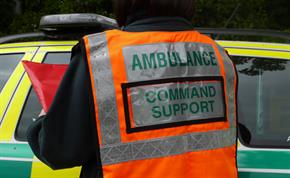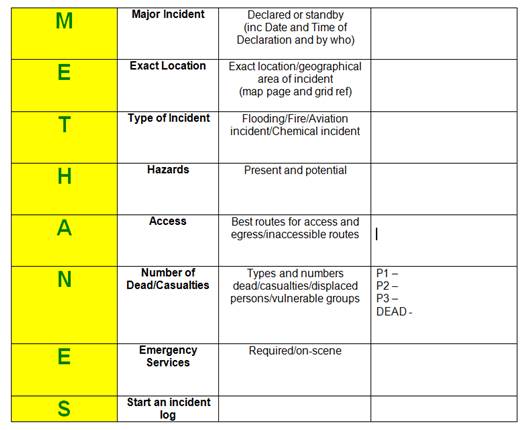
Following a number of recent large-scale incidents across the region, the resilience team has provided the following guidance for all frontline staff and managers.
All staff should be aware of how to declare either a major incident standby or major incident declared. Both these terms will result in significant escalation of the incident and both will elicit a cascade of information across the healthcare system. The basic difference between them is whether we are dealing with potential large numbers of casualties (a standby), or actual large numbers of casualties (a declared incident).
When first arriving on scene it is imperative to remain calm and consider what you are presented with. There might be no clear answer, as the member of staff faced with the incident must follow their training and instincts, based upon what they can see and know about the incident. Be calm and clear and report back as much information as you can in your initial METHANE situation report, this will assist in getting the right levels of support to you as quickly as possible. Below is a brief description of the terms we use.
(Any grade of staff) Major incident – standby: this alerts the Trust and wider healthcare partners such as hospital(s) that a major incident is possible which could result in large numbers of casualties. A number of staff and partner organisations need to be informed and some, such as the hospitals, may consider clearing space for incoming casualties and calling in additional staff. EEAST cascade will be initiated for a standby call and additional resources will allocated to attend the incident and make an assessment of the scene for further actions. (It is important to note that initial resources deployed will often be the same for a major incident standby or declared)
(Any grade of staff) Major incident – declared: in this case the incident has resulted in confirmed large numbers of casualties and a full response is required. This will activate the full plan for EEAST and actions for wider healthcare partners, for example the receiving hospital(s) will start clearing A&E and potentially theatres and additional staff will be called in to support. EEAST cascade will be increased and consideration will be given at a strategic level to requesting national mutual aid and support. The national coordination centre may also be stood up to assist.
Any standby or declared alert must be sent as part of a METHANE situation report as soon as possible (within 10 minutes):

When making a METHANE report if you are unsure of the information required please refer to your pocket guide or ask the dispatcher to guide you through each step in turn to ensure you cover each point that is required.
(Officer) major incident – cancel: the term used to cancel a major incident alert.
(Officer) ambulance major incident stop: the term used to indicate that sufficient resources are available at the scene and no further assistance is required.
(Officer) ambulance major incident stand down – The term used to indicate the conclusion of all ambulance service activity in connection with a declared major incident and a return to normal modes of operation.
The Trust faces the risk of significant or major incidents every day, but they are rare. All staff should feel confident of how to deal with being first on scene and if you require clarification or further support in any of these areas please do not hesitate to contact your line manager or a member of the resilience team.
Published 9th July 2015